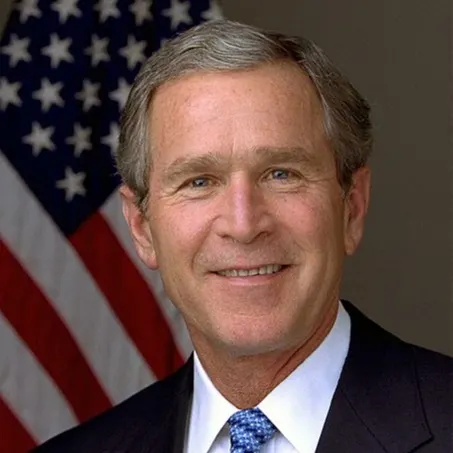
CIA Agent's Identity Leaked
Seal of the Central Intelligence Agency. Photo courtesy of the United States Federal government. Public domain.
On June 5, 2007, U.S. District Judge Reggie Walton sentenced "Scooter" Libby, former chief of staff to Vice President Dick Cheney, to 30 months in federal prison and a $250,000 fine. The sentence marked the culmination of an investigation into the leak of CIA agent Valerie Plame Wilson's secret identity. Libby was convicted of obstruction of justice, perjury, and making false statements in connection to the leak, which stemmed from a broader controversy over the U.S. government's justification for the Iraq War.
 Portrait of Scooter Libby, in 1991. Photo by Russell F. Roederer. Public domain.
Portrait of Scooter Libby, in 1991. Photo by Russell F. Roederer. Public domain.
CIA Agent's Identity Leaked
The origins of the case trace back to a July 2003 column by journalist Robert Novak, who revealed Plame's identity as a CIA operative. Plame wrote about the effects of the leak in an article published by ForeignPolicy.com calling it traumatic and stating that it, "Endangered my assets, ended my covert career, and unsettled my family."
 Author and former CIA agent Valerie Plame in 2014. Photo Courtesy of Larry D. Moore under CC BY 4.0
Author and former CIA agent Valerie Plame in 2014. Photo Courtesy of Larry D. Moore under CC BY 4.0
The disclosure came after Plame's husband, former Ambassador Joseph Wilson, publicly criticized the Bush administration over the invasion of Iraq. Wilson's op-ed in The New York Times asserted that intelligence related to Iraq's nuclear weapons program had been fabricated to justify the invasion.
Fitzgerald Investigates
The leak of Plame's identity led to a two-year investigation by Special Counsel Patrick Fitzgerald. In October 2005, Fitzgerald indicted Libby, charging him with obstruction of justice, making false statements, and perjury. Libby, who had resigned from his post in the White House, pleaded not guilty. However, a jury found him guilty on four of the five counts.
Libby Appeals
Libby's June 2007 sentencing made him the highest-ranking White House official to be convicted of a felony since John Poindexter, President Reagan's national security adviser, was convicted during the Iran-Contra affair. Libby appealed to overturn the order that he start serving his time immediately, but the request was denied. Luckily for Libby, on July 2, 2007, President George W. Bush commuted his sentence while leaving the fine and probation intact. Bush described the prison sentence as "excessive" while stating that he did respect the jury's decision.
 Official photograph portrait of U.S. President George W. Bush. Photo courtesy of Eric Draper. Public domain.
Official photograph portrait of U.S. President George W. Bush. Photo courtesy of Eric Draper. Public domain.
The investigation and trial were highly controversial, with Vice President Cheney labeling them as politically motivated. Cheney believed that an eager prosecutor and liberal jury had wrongly criminalized Libby's lapse in memory. Although Cheney initially accepted Bush's commutation, he later pushed for a full pardon for Libby, which Bush did not grant during his presidency.
Trump's Pardon
The saga surrounding the Plame leak did not end with Libby's commutation. In 2013, Virginia Governor Bob McDonnell restored Libby's voting rights, along with those of approximately 1,000 other former felons. Five years later, on April 13, 2018, President Donald Trump granted Libby a full pardon. Trump stated that he did not know Libby personally but believed that he had been treated unfairly.
The Facts Haven't Changed
Whether Trump made the right choice by pardoning Libby is up for debate. In response to the pardon, Special Counsel Fitzgerald maintained that Libby had received a fair trial, and that the jury's verdict was based on clear evidence. He emphasized that while the president had the right to pardon, the facts of the case had not changed since the 2007 decision. However, as reported by Politico, there are those like Dick Cheney who argue that Libby was a "totally innocent man."
References: Timeline: The CIA Leak Case | 'Scooter' Libby sentenced to federal prison, June 5, 2007 | What It's Actually Like Being a Woman in the CIA























